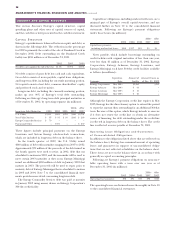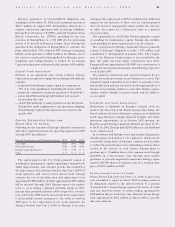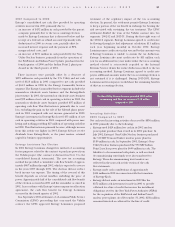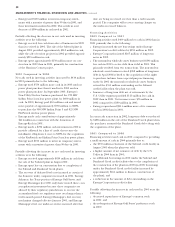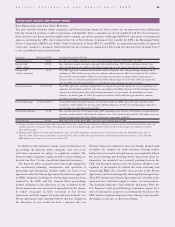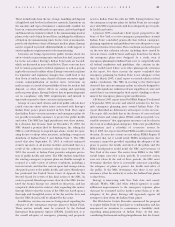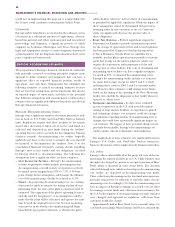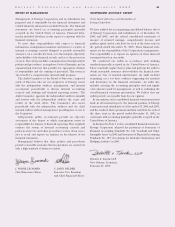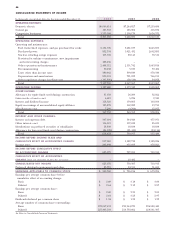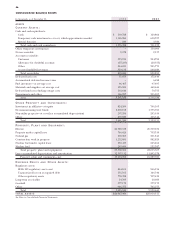Entergy 2002 Annual Report Download - page 38
Download and view the complete annual report
Please find page 38 of the 2002 Entergy annual report below. You can navigate through the pages in the report by either clicking on the pages listed below, or by using the keyword search tool below to find specific information within the annual report.
funds that are designed to approximate or somewhat exceed
the return of the Standard & Poor’s 500 Index, and a small
percentage of the securities are held in a fund intended to
replicate the return of the Wilshire 4500 Index. The decom-
missioning trust funds are discussed more thoroughly in Notes 1
and 9 to the consolidated financial statements.
UTILITY RESTRUCTURING
Major changes are occurring in the wholesale and retail electric
utility business, including in the electric transmission business.
In Entergy’s U.S. Utility service territory, movement to retail
competition either has not occurred, has been significantly
delayed, or has been abandoned. At FERC, the pace of restruc-
turing at the wholesale level has begun but has also been
delayed. It is too early to predict the ultimate effects of changes
in U.S. energy markets. Restructuring issues are complex and
are continually affected by events at the national, regional, state,
and local levels. These changes may result, in the long-term, in
fundamental changes in the way traditional integrated utilities
and holding company systems, like the Entergy system, conduct
their business. Some of these changes may be positive for
Entergy, while others may not be.
In the long-term, these changes may result in increased costs
associated with utility unbundling of services or functions and
transitioning in new organizational structures and ways of
conducting business. It is possible that the new organizational
structures that may be required will result in lost economies of
scale, less beneficial cost sharing arrangements within utility
holding company systems, and, in some cases, greater difficulty
and cost in accessing capital. Furthermore, these changes could
result in early refinancing of debt, the reorganization of debt, or
other obligations between newly formed companies and
Entergy. As a result of federal and state “codes of conduct” and
affiliate transaction rules, adopted as part of restructuring, new
non-utility affiliates in Entergy’s system may be precluded from,
or limited in, doing business with affiliated electric market
participants, or have prices set at the lower of cost or market. In
addition, regulators may impose limits on (price caps), rather
than have the market set, wholesale energy prices. There are a
number of other changes that may result from electric business
competition and unbundling, including, but not limited to,
changes to labor relations, management and staffing, structure
of operations, environmental compliance responsibility, and
other aspects of the utility business.
Transmission
In 2000, FERC issued an order encouraging electric utilities to
voluntarily place their transmission facilities under the control
of independent regional transmission organizations (RTOs).
These organizations were to be operational by December 15,
2001, but delays have occurred as utility companies and federal
and state regulators work to resolve various issues related to the
establishment of RTOs.
Entergy’s domestic utility companies are participating with
other transmission owners within the southeastern United
States to establish an RTO, the proposed SeTrans RTO. In
October 2002, FERC issued a declaratory order approving
certain central aspects of the SeTrans RTO proposal. Because
of retail regulatory concerns regarding RTOs, certain retail
regulators ordered the domestic utility companies to evaluate
the costs and benefits associated with establishing such
entities. The Southeastern Association of Regulatory Utility
Commissions commissioned a separate cost-benefit study that
was intended to evaluate similar issues for the entire
Southeast, including the region that would be covered by the
proposed SeTrans RTO. Both cost-benefit studies concluded
that an RTO, if properly structured (e.g., locational marginal
prices to manage congestion, participant funding for expan-
sion cost), can provide benefits for the customers of the
domestic utility companies. However, a number of important
issues relating to the design of the transmission tariffs and the
terms of the proposed SeTrans RTO remain to be finalized
and approved by regulators. Until this process is complete,
Entergy cannot predict the impact that RTO developments
will have on its financial condition, results of operations, or
liquidity. Entergy does not expect the SeTrans RTO to become
operational before the end of 2004.
Retail
Only in the Texas portion of Entergy Gulf States’ service terri-
tory has there been significant retail open access activity, but
implementation has been delayed in that territory. Entergy
does not expect that retail open access within the context of
a functional FERC-approved RTO is likely to begin for Entergy
Gulf States before the end of 2004. Entergy Gulf States has
recently filed a proposal with the PUCT for an interim solution
to begin retail open access on January 1, 2004, or otherwise
delay retail open access until at least 2007. While the PUCT
has approved a basic business separation plan for Entergy Gulf
States in Texas, several other proceedings necessary to imple-
ment retail open access are still pending in Texas. In addition,
the LPSC has not approved certain matters needed for retail
open access to begin in Texas. Delay in the start of retail open
access may delay or jeopardize the regulatory approvals needed
to comply with Texas, Louisiana, and federal law and may
therefore have an adverse effect on Entergy. Retail open access
legislation has not been enacted in the other jurisdictions in
Entergy’s service territory, except for in Arkansas, where it was
recently repealed.
NUCLEAR MATTERS
The domestic utility companies, System Energy, and Non-Utility
Nuclear subsidiaries own and operate, through affiliates, ten
nuclear power generating units. Entergy is, therefore, subject
to the risks related to owning and operating nuclear plants.
MANAGEMENT’S FINANCIAL DISCUSSION AND ANALYSIS continued
36
In Entergy’s U.S. Utility service territory, movement to
retail competition either has not occurred, has been
significantly delayed, or has been abandoned. At FERC,
the pace of restructuring at the wholesale level has
begun but has also been delayed.




